|
|
|
Sort Order |
|
|
|
Items / Page
|
|
|
|
|
|
|
| Srl | Item |
| 1 |
ID:
150887
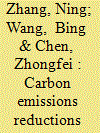

|
|
|
|
|
| Summary/Abstract |
China's manufacturing industries are traditionally energy-intensive sectors and are responsible for over half of the country's total CO2 emissions. In this paper, we propose a global meta-frontier non-radial directional distance function approach to measure the CO2 emissions performance of Chinese manufacturing sectors during the period of 1990–2012. This approach allows us to simultaneously consider technological heterogeneity in manufacturing, non-radial slacks, and undesirable outputs. The global level of environmental technology is incorporated into the efficiency model to improve discriminating power and comparability. The results indicate significant differences in CO2-emissions-reduction performance among five broad groups of Chinese manufacturing industries. The “global technologies/ innovators group” is the most efficient under meta-frontier technologies, with the smallest technology gap. Meanwhile, the “energy-/resource-intensive commodities group” is, on average, the least efficient. Therefore, the Chinese government should implement targeted policies that encourage firms in the global technologies/innovators group to increase market share while supporting those in the energy-/resource-intensive commodities group to upgrade their technologies.
|
|
|
|
|
|
|
|
|
|
|
|
|
|
|
|
| 2 |
ID:
125722


|
|
|
|
|
| Publication |
2013.
|
| Summary/Abstract |
This paper aims to conduct a comparative study of the changes in CO2 emission performance of state-owned fossil fuel power plants between China and Korea. For this purpose, we combine the concept of the metafrontier Malmquist productivity index and the non-radial directional distance function to develop a new index called the non-radial metafrontier Malmquist CO2 emission performance index (NMMCPI). This new methodology allows for the incorporation of technological heterogeneities and slack variables into the previously introduced Malmquist CO2 emission performance index (MCPI). The NMMCPI can be derived by solving several non-radial data envelopment analysis (DEA) models. The NMMCPI can be decomposed into an efficiency change (EC) index, a best-practice gap change (BPC) index, and a technology gap change (TGC) index. By fixing the non-energy inputs, we measure the pure CO2 emission performance change. Based on the proposed indices, the comparative study between Chinese and Korean fossil fuel power industries is conducted for the 2005-2010 period. Empirical results indicate significant differences in terms of various decomposed CO2 emission performance changes between China and Korea. Korean power plants demonstrate improvements in innovation, while Chinese power plants demonstrate a higher ability for technological leadership. Some related policy implications are also proposed based on the empirical results.
|
|
|
|
|
|
|
|
|
|
|
|
|
|
|
|
| 3 |
ID:
192360


|
|
|
|
|
| Summary/Abstract |
This paper investigates the effect of air pollution on employees' earnings in China. Using both instrument variable (IV) and regression discontinuity design (RDD), we find that air pollution reduces employees' yearly earnings. A one μg/m3 increase in yearly PM2.5 decreases employees' yearly earnings by 175.4 CNY. The total loss in earnings for all employees working for our sample firms amounts to about 268.59 million CNY. Our estimations are not sensitive to a battery of different robustness checks. We also find that the effect of air pollution differs based on several factors including labor intensity, ownership types and firm size. Our mechanism tests indicate that air pollution can reduce employees' earnings by lowering their unit wage and reducing their working time. The resulting increase in firms' labor costs further undermines their operating status. Notably, air pollution exerts a non-linear negative effect on employees' earnings. Overall, our findings suggest that air pollution can significantly lower employees' benefits by reducing their earnings. Our paper also provides powerful support for formulating environmental regulations in the future.
|
|
|
|
|
|
|
|
|
|
|
|
|
|
|
|
| 4 |
ID:
132770
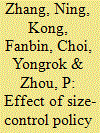

|
|
|
|
|
| Publication |
2014.
|
| Summary/Abstract |
This paper examines the effect of size control policy on the energy and carbon efficiency for Chinese fossil fuel power industry. For this purpose, we propose two non-radial directional distance functions for energy/carbon efficiency analysis of fossil fuel electricity generation. One is named a total-factor directional distance function that incorporates the inefficiency of all input and output factors to measure the unified (operational and environmental) efficiency of fossil fuel power plants, and the other is called an energy-environmental directional distance function that can be used to measure the energy-environmental performance of fossil fuel electric power plants. Several standardized indicators for measuring unified efficiency and energy-environmental performance are derived from the two directional distance functions. An empirical study of 252 fossil fuel power plants in China is conducted by using the proposed approach. Our empirical results show that there exists a significant positive relationship between the plant size and unified efficiency, the five state-owned companies show lower unified efficiency and energy-environmental performance than other companies. It is suggested that Chinese government might need to consider private incentives and deregulation for its state-owned enterprises to improve their performance proactively.
|
|
|
|
|
|
|
|
|
|
|
|
|
|
|
|
| 5 |
ID:
121323
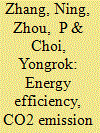

|
|
|
|
|
| Publication |
2013.
|
| Summary/Abstract |
This paper proposes a meta-frontier non-radial directional distance function to model energy and CO2 emission performance in electricity generation. This approach allows for the consideration of the group heterogeneity of electricity generation, non-radial slacks, and undesirable outputs simultaneously. We extend several standardized indices to measure total-factor energy efficiency, CO2 emission performance, and technology gaps in electricity generation. We estimate the potential reductions in energy use and CO2 emissions under different technology assumptions. We conduct an empirical analysis of fossil fuel electricity generation in Korea by using the proposed approach. The results indicate that coal-fired power plants show higher levels of total-factor energy efficiency and CO2 emission performance than oil-fired ones. Under the meta-frontier technology assumption, coal-fired power plants show a smaller technology gap than oil-fired ones. This suggests that the Korean government should promote technological innovation to reduce technology gaps for oil-fired plants, thereby improving energy and CO2 emission performance and meeting emission reduction targets in the electricity generation industry.
|
|
|
|
|
|
|
|
|
|
|
|
|
|
|
|
| 6 |
ID:
122736
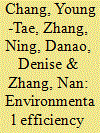

|
|
|
|
|
| Publication |
2013.
|
| Summary/Abstract |
Many countries are worried about reducing energy consumption and environmental pollution while increasing the productivity and efficiency of their industries. This study intends to contribute to the literature by proposing a non-radial DEA model with the slacks-based measure (SBM) to analyze the environmental efficiency of China's transportation sector. The results show that most of the provinces in China do not have an eco-efficient transportation industry. The environmental efficiency levels in most of the provinces are lower than 50% of the ideal or target level. Therefore, China's transportation industry is environmentally very inefficient. China can reduce a great deal of carbon emissions in each province ranging from at least 1.6 million TOEs in Qinghai and at most 33 million TOEs in Guangdong and Shanghai.
|
|
|
|
|
|
|
|
|
|
|
|
|
|
|
|
| 7 |
ID:
133734
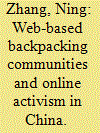

|
|
|
|
|
| Publication |
2014.
|
| Summary/Abstract |
This article examines activism that has emerged in online communities. This ethnographic study of two web-based backpacking communities shows that citizens and activists use the Internet mainly for forming communities, sharing information, instilling democratic values and solving immediate social problems. They do not call for cyberwar, acts of hacktivism or other sorts of offensive online and offline actions, but seek to bring social justice and improve well-being within their sphere of influence. The dynamics of this new online activism and its significance for the development of associational life and civil society in China are explored in this article.
|
|
|
|
|
|
|
|
|
|
|
|
|
|
|
|
|
|
|
|
|